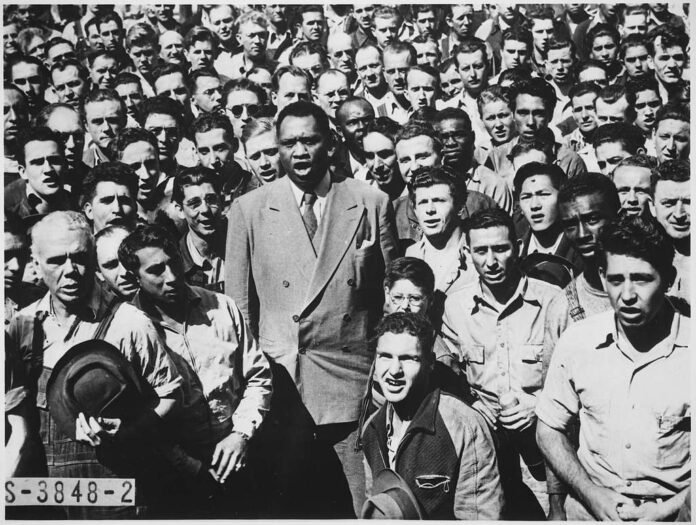From the streets of Paris to the ports of Manila and the heart of Los Angeles, International Workers’ Day was marked by mass protests condemning policies linked to U.S. President Donald Trump’s second term. Demonstrators across Asia, Europe, and North America voiced opposition to global inequality, economic uncertainty, and labor erosion, fueled in part by the American administration’s tariff wars and immigration crackdowns.
In France, union leaders decried the “Trumpization” of global politics. In Italy, demonstrators paraded a puppet of Trump through the streets of Turin. In Germany and Switzerland, unionists warned that extended work hours and rising anti-immigrant sentiment were dismantling labor protections and emboldening authoritarian movements.
Anger and Activism Stretch Across Continents
More than 200,000 workers were expected to rally in Southeast Asia, while tens of thousands marched in Turkey, Taiwan, and Japan. In each location, Trump’s economic agenda loomed large, symbolized by banners, effigies, and speeches calling for solidarity and justice.
READ MORE: Return Respect for the Rule of Law and Human Rights to International Politics
In Japan, a truck in the Tokyo march carried a Trump-like doll, and demonstrators demanded higher wages, gender equality, disaster relief, and an end to global conflicts.
“For our children to live with hope, the rights of workers must be recognized,” said Junko Kuramochi, a Tokyo mother and activist.
Economic Disruption Sparks Asian Backlash
In Taipei, about 2,500 workers marched from the presidential office, warning that Trump’s tariffs could jeopardize Taiwan’s labor force. Union leader Carlos Wang highlighted job loss risks while autoworkers displayed a symbolic Trump-topped car.
Taiwan President Lai Ching-te responded with a proposed 410-billion New Taiwan dollar ($12.8 billion) economic package to safeguard local industries.
In the Philippines, thousands rallied near the presidential palace, blocked by barricades as they demanded wage hikes and local job protections. Activist Mong Palatino condemned Trump’s policies, saying “tariff wars and policies of Trump” threaten livelihoods.
In Indonesia, President Prabowo Subianto addressed cheering crowds in Jakarta, promising to eliminate poverty. Workers called for wage increases, an end to outsourcing, and protections for migrant laborers.
Democracy and Labor Converge in Turkey
In Istanbul, the May Day focus extended beyond wages. Tens of thousands gathered on the Asian shore to protest the imprisonment of opposition mayor Ekrem Imamoglu, arrested in March. Turkish authorities locked down central Istanbul, detaining over 400 people, including lawyers near Taksim Square.
“Democracy and labor rights are inseparable,” said a demonstrator in Kadikoy. “We will not let them silence us.”
May Day in the U.S.: Protests Target Trump Agenda
In Los Angeles, one of the world’s largest May Day demonstrations is expected just days after Trump passed the 100-day mark of his return to office. The protest, organized by labor unions, immigrant rights groups, and student organizations, aims to push back against what activists call a sweeping rollback of worker protections.
“This administration is attacking workers, unions, immigrants — and we won’t be silent,” said April Verrett, president of the Service Employees International Union (SEIU).
Rallies across New York, Chicago, and San Francisco echoed the same message: defend public services, support immigrant workers, and fight economic inequality.
A massive banner in the L.A. march summarized the mood: “One Struggle, One Fight — Workers Unite!”
Trump’s Policies a Unifying Theme in Global Discontent
Despite local variations in grievances — from labor laws to democratic erosion — Trump’s trade and immigration policies served as a lightning rod for worker anger worldwide. Union leaders warned that tariffs were destabilizing industries, pushing wages down, and exacerbating global tensions.
In Bern, Switzerland, demonstrators rallied against fascism and militarism, holding Washington partly accountable for the global shift toward hard-right policies.
“This is no longer about one country,” said a marcher in Berlin. “It’s about a movement. Workers everywhere are saying: Enough.”
A Growing Chorus for Change
This year’s International Workers’ Day was not just a call for wage increases or better conditions. It was a sweeping rejection of policies perceived as favoring wealthy elites over working families, a loud global assertion that workers’ rights, democracy, and peace must be protected.
As rallies ended with chants, music, and clenched fists raised skyward, a single refrain echoed from Manila to Madrid: “Workers of the world, unite.”
